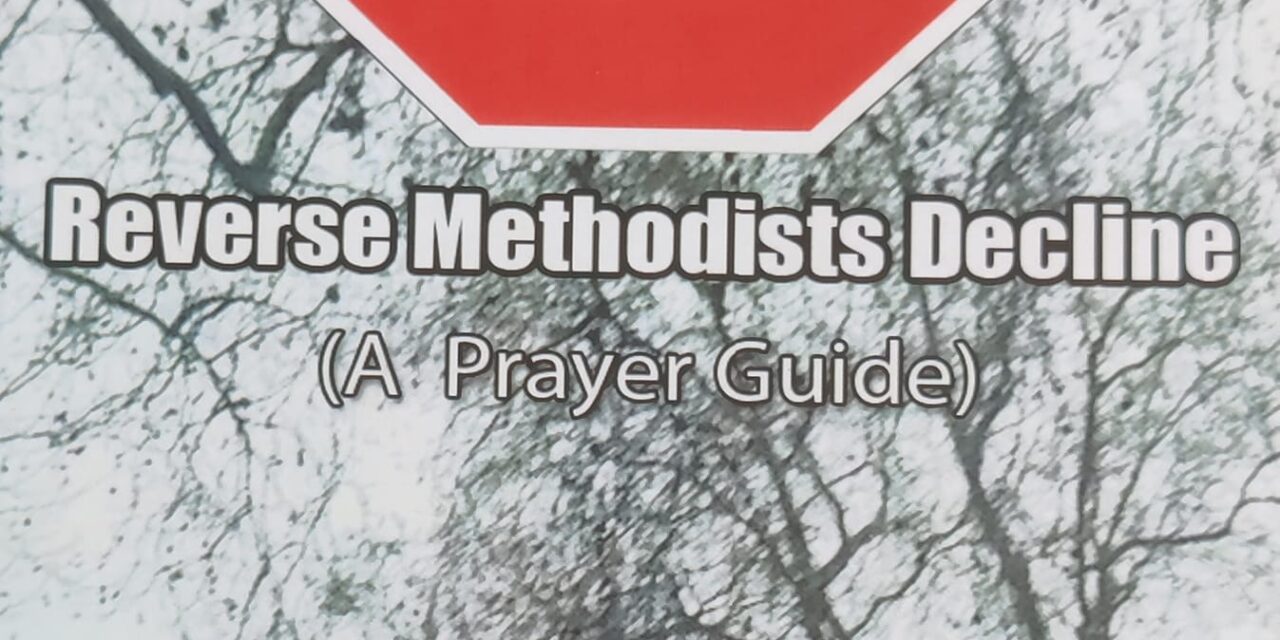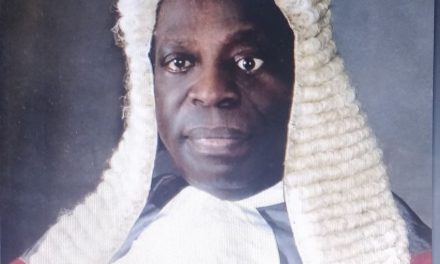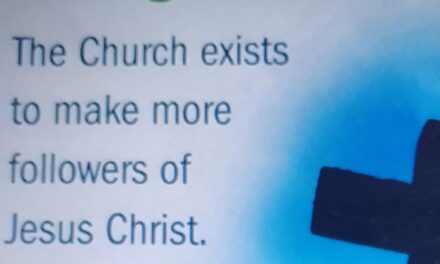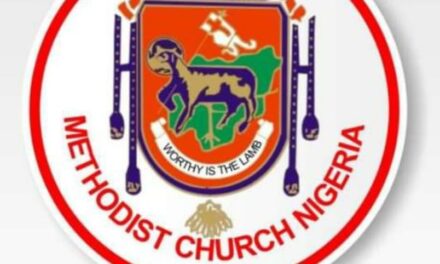One of my books, Stop the Funeral: Reverse Methodists Decline, published in 2017 was inspired by the Rev Loraine Mellor’s 2017 Presidential inaugural address. Mellor’s address resonates with the fear of John Wesley. For me, as a student of John Wesley’s writings and practices, his prophetic words near the end of his life is fulfilling a prophetic concern today. Wesley said, “I am not afraid that the people called Methodists should ever cease to exist either in Europe or America. But I am afraid lest they should only exist as a dead sect, having the form of religion without the power. And this undoubtedly will be the case unless they hold fast both the doctrine, spirit, and discipline with which they first set out. What was their fundamental doctrine? That the Bible is the whole and sole rule both of Christian faith and practice.”[1] In the beginning, Methodism that spread like a wildfire to other parts of the world through field preaching and conversion of souls was not a loose belief and practice. This central religious experience is what Wesley described as the theology of ‘the way to Heaven.’[2] Methodist decline is a missional and leadership challenge, a deception that has to do about a formlessness of our religious doctrine, spirit, and discipline of our tradition that neglects the power of GRACE – God’s Redemption At Christ’s Expense. Indeed, our Methodist decline is the harvest of our Methodist deception and distractions from a faithful witness of our past scriptural Christian heritage.
Professor Bryan Turner in his 1970 doctoral thesis titled, The Decline of Methodism explained that, Methodist beliefs and practices has been important relationships with early Methodist growth and spirituality. According to him, Methodism presupposes a system and method of beliefs, involvement in communal scriptural holiness reaffirms and strengthen shared beliefs. The decline of Methodist beliefs, practices, and experience has been the root causes of our membership decline. ‘Under two levels of analysis, Turner examined and historically traced the decline of Methodism in individual religious commitment in the dimensions of belief, practice and experience, and church and leadership organisations. In essence, the neglect and redefinitions of these beliefs and practices to suit the seductions of today’s cultures points to the increasing speed of Methodist decline,[3] a departure from the early standard of Methodism especially organisational failure to recruit new members. This formed the organisational implication of Methodism withdrawal from revivalism, a ‘shift in emphasis that overtime Methodism became increasingly dependent on an inherited rather than converted membership.’ Conversion became less encouraged and it became less experienced. Methodists decline is first the decline of beliefs, practices and experiences before the decline of membership. Methodist decline has continued unabated since the dawn of the 20th Century and according to Chris Ritter, ‘today the denomination is on life support.’[4] Anything that undermines the raison d’etre of Methodism in spreading scriptural holiness across the land is a deception. Structures of governance, discipline, policies or debates that does not renew Methodism, divides and declines it.
The main source of the early “mother Church” Methodism’s health and growth was through the family and traditional marriage. Attempts to redefine these beliefs and practices amounts to a departure from the early catholicity of the Methodist witness, doctrine, spirit and discipline. The early “mother Church” of world Methodism was about doctrine, spirit, discipline, and power, and without them, we will not only decline, we are dead (2 Thess 1:11). The Methodist first Conference in 1744 Minutes reveals the ministry and power of Methodism and its early “mother Church.” Today, we can see signs of powerlessness around us. Power is not measure in statistics, budget or programs just as the anointing is not measure in sweat and spit. Christian power is defined by the definite Scriptural text, “But you shall receive power when the Holy Spirit has come upon you; and you shall be witnesses to Me in Jerusalem, and in all Judea and Samaria, and to the end of the earth” (Acts 1:8). We need the power of God for the following: Conversion of sinners (Lk 1:17, Rom 1:16, 1 Cor 1:18, 25, 1 Thess 1:5) Spiritual growth and effective Christian living (Rom 15:13. 2 Cor 1:3-4, 2 Tim 1:7, 2 Pet 1:3). Bold and effective witnessing (Acts 1:8). Healing (Lk 5:17, Acts 3:12, 4:7). Defeat of Satan and his kingdom (Lk 4:36). Persevering and overcoming faith (2 Cor 4:7, 2 Cor 12:9, 2 Tim 1:8). Enablement in ministry (Eph 3:7, 20). The early “mother Church” of world Methodism’s engaging power is for all posterity to witness to reform the nation, particularly the church.[5]
When we are devoid of God’s power, fictions becomes facts, lies becomes truth and imaginations becomes history. We will attempt to manufacture something that resembles ministry, but it is not true. God empowers ministry (2 Tim 3:5). We will resort to demonstrations of human wisdom, cleverness, and ability in order to imitate the fruits and results of true ministry, but in the end it is just a show (1 Cor 2:4-5). Some substitute the works of Satan and claim they are from God, sometimes unwittingly, but this only brings disorder and disillusionment (2 Thess 2:9, Acts 8:10).
Our present “mother Church of world Methodism need reawakening. R.C. Sproul said, “You can’t improve upon the Gospel because God put His power there.” Methodism will not be substitute by icon, formality, and allegory. Methodism is just not about Public Relations or church growth schemes and expressions. Methodism is not ‘seculodism,’ a mashup of Methodism and secularism. Methodism came ‘not only in word but also in power and in the Holy Spirit and with full conviction (1 Thess 1:5). The historical and spiritual decline of Methodist commitment and the ‘curtailment of the Methodist emphasis on personal experience and the undermining of disciplined personal and public practice resulted in uncertainty of belief.’ In Modern Methodism, beliefs which delineate the state of sin have been greatly weakened. For example, a central belief of Wesleyanism, the fears of Original Sin no longer trouble present day Methodists. Turner explained that, the present day Methodists have more commitment to the problem of what might be termed “present sin” just as ‘the church that does nothing to stop this slide into moral crisis and atheism ultimately contributes to it.’
On the state of Methodist Church in Britain, Rev Mellor said in 2017, “My fear and my nightmare, is that as a church we will decline so much we will go out of existence as Methodists, we will not have many people around but we will be very rich as there are millions of pounds locked away in church funds. I fear that we are not being hospitable and generous with what we have. We are not using our money to enabling people to learn how to share Jesus.’[6] Indeed, the fear of Wesley in 1786 was Mellor’s nightmare in 2017 and on track to die out by 2045. Mellor’s vision in 2017 was to take radical risks to change our future against the dwindling membership bearing in mind that ‘we don’t have too many churches, we just don’t have enough people in them.’ Mellor’s testimony on how Mrs Wroe introduced her to God and instilled in her passion for Jesus, keeping it real with her encounter with the Holy Spirit reminds us about the secret of the growth of early Methodists.
Mellor’s fear and nightmare in 2017 is practically expressed in the June 10, 2022, Methodist Recorder news report captioned; ‘Methodist Church ‘on track to die out by 2045.’[7] The forecast made by a mathematician specialising in church statistics, John Hayward resonates with the finding on the dynamics of Methodists membership growth and decline by Alan Piggot of the Strategic Research team formerly at the Methodist Church House.[8] According to Piggot, the London Methodism’s multicultural dimension points to a sad numerical decline of churches, decline in London churches membership and fallen numbers of ministers (presbyters). Indeed, ‘in the last ten years, London’s annualised rate of membership decline, at 1.0% then, compares favourably with 3.5% year-on-year decline of British Methodism as a whole, making it the slowest decline of its 31 districts.’[9]
The Methodist Recorder’s Comment titled ‘Facing up to membership decline’[10] in response to the sad news report ‘Methodist Church ‘on track to die out by 2045’ calls for repentance, prayer and effectiveness in outreach and evangelism. According to the Recorder Comment, ‘it is very difficult to challenge’ the conclusion of Hayward’s analysis coupled with the contributions and revelations form Turner and Piggot. The good news is that, Hayward’s forecast is not the end of Methodism as a global Connexions. Beyond and before regionalisation institutional programme of the present “mother church” of world Methodism of bringing together churches, the concluding question from the Recorder Comment need a prayerful humble discernment and consideration. According to Recorder’s Comment, ‘perhaps the “mother Church” of world Methodism now needs to learn from its offspring?’ Our “mother Church” beyond a Wesley’s Church of England need its offspring just as the offspring need her. The strength of our “mother Church” is not in her self theological isolation but in upholding our doctrine, spirit, and discipline with which we first set out.
In her functions of spreading, nourishing and protecting Methodist doctrine, spirit and discipline of scriptural holiness, our early “mother Church” of world Methodism before and after John Wesley passed away on 2nd March 1791 after eighty six years of the world renewal, ‘Methodist missionaries from Britain,… have taken the gospel all around the world at great personal cost.’ According to Philip Meadows, from the earliest time Methodist men and women have shared this missionary impulse to communicate the gospel they have received, and to make disciples who share the blessings of this spiritual movement’ all over the world.[11] That was the world according to our early “mother Church” of world Methodism. By 1837, our early “mother Church” Methodist missions have reached and produced offspring in America, Africa, Canada, South India, and Australia and other parts of the world.
The world according to our early “mother Church” of world Methodism, spirituality presupposes ‘a system of beliefs, involvement in communal ritual reaffirms and strengthens shared beliefs.’[12] The world according to our early “mother Church” Methodism was focus on personal experience that does not undermine personal discipline and public practices corporate renewal. These involve a tie to the path to salvation. According to Meadows, ‘the biographies of Methodist missionaries (mother Church) display a confidence in the gospel of personal salvation, the life-transforming power of the Spirit and the promise of perfect love’ and not just sensual seductive love in today’s culture. The world according to our early “mother Church” Methodism reminds us about the early Methodist genes ‘transmitted through nineteenth Holiness Movements into contemporary Pentecostalism – which is perhaps the most widespread and vibrant form of Christianity in the world church’ including the offspring of our “mother Church” of world Methodism.
The challenge today is that, while the offspring of the early “mother Church” of world Methodism are still holding unto the incarnational ‘missionary impulse to communicate the gospel they have received, and to make disciples who share the blessings of this spiritual movement,’ there is a huge paradigm shift in the present “mother Church” of world Methodism.[13] According to Tom Stuckey, a past President of the British Methodist Conference, ‘the Church, I contend, exists in a Babylon which snaps, snarls and beguiles the people of God.’ Stuckey with reference to Callum Brown’s and Michael Riddell’s books, The Death of Christian Britain and Threshold of the Future explained that, ‘Britain is showing the world how religion as we have known it can die … the Church in Britain has become the greatest barrier to the Gospel. Locked in an iron cage and controlled by an ecclesiastical elite of clergy and powerful lay persons, it has become a stagnant pool.’[14]
By recruiting new members and converts, God continue to multiply the offspring of present “mother Church” of world Methodism as the stars of heaven and as the sand that is on the seashore (Gen 22:17-18). In the offspring of “mother Church” of world Methodism, all the nations of the earth are being blessed through the living faith of prayer and intercession, open air services and evangelism, conversion of souls, vibrant Men’s’ and Women’s’ fellowships, Scripture informed Sunday school and theological training for ministerial and lay leaders. In many of the offspring of the “mother Church” of world Methodism, our seminaries remains true custodian of Methodist lore, missional formation, church planting and training of expert interpretation of our spirituality and tradition.[15] Comparatively, using the words of Stuckey, the future of the present “mother Church” of world Methodism ‘does not depend on upgrading premises, tinkering with structures, devising new strategies either local or Connexional. We will have a future when prayer rather than projects saturate our agenda. We will have a future when presbyters drag themselves away from their computers and get out and talk to people, helping them to pray, discover God in the world and talk about it. We will have a future when Methodists, who long to love God with all their heart, mind and soul feel the transforming power of the Spirit.’[16] Methodist Recorder’s Comment aptly provides us a humble conclusion on one model for the future of British Methodism, our present “mother Church” of world Methodism – that ‘might be found in our sister Churches in mainland Europe,’ Africa, Asia, Latin America and other parts of the world.
[1] Okegbile, Deji, Stop the Funeral: Reverse Methodists Decline (London: Supertec, 2017), p. 25
[2] http://dejiokegbile.com/wesleys-day-only-in-name-decline-in-methodist-beliefs-practices-and-experiences-%ef%bb%bf/
[3] http://dejiokegbile.com/wesleys-day-only-in-name-decline-in-methodist-beliefs-practices
[4] Okegbile, Stop the Funeral:, p. 17
[5] Thomas, Jackson (ed), THe Works of John Wesley, 14 vols (Grand Rapids, MI: Baker Book House, 1978), vol 8, p, 299
[6] Okegbile, Deji, Stop the Funeral: Reverse Methodists Decline (London: Supertec, 2017), p. 49
[7] Methodist Recorder, Issue 8581, June 10, 2022, p. 2
[8] Piggot, Alan, ‘Growth and decline in London Methodism, 1980 to the present’ in Goodhew, David, Cooper, Anthony-Paul, The Desecularisation of the City: London’s Churches, 1980 to the Present (London: Routledge, 2019), pp. 148-166.
[9] Piggot, ‘Growth and decline in London Methodism, 1980 to the present,’ pp. 149
[10] Methodist Recorder, Issue 8581, June 10, 2022, p. 6
[11] Meadows, Philip, Wesleyan DNA of Discipleship (Cambridge: Grove Books, 2013), pp. 25-26
[12] http://dejiokegbile.com/the-world-according-to-methodism-celebrating-methodist-mission-house-80/
[13] Stuckey, Tom, Singing the Lord’s Song in a Strange Land: The Future of the Church in Britain, A Methodist Perspective ( Church in the Market Place, 2017), p. viii
[14] Callum Brown and Michael Riddell cited in Stuckey, Singing the Lord’s Song in a Strange Land, pp. 48-49
[15] Okegbile, Deji, Nigerian Methodists Year of Jubilee (Ibadan: Oluseyi Press, 2012) pp. 28-31
[16] Stuckey, Singing the Lord’s Song in a Strange Land, p. 135











The recent sacking of a lecturer from Cliff speaks volumes about where Methodism is headed. I always thought we were supposed to be in the world but not of it. Instead we seem to be tripping over ourselves trying to appear to be 100% of the world.